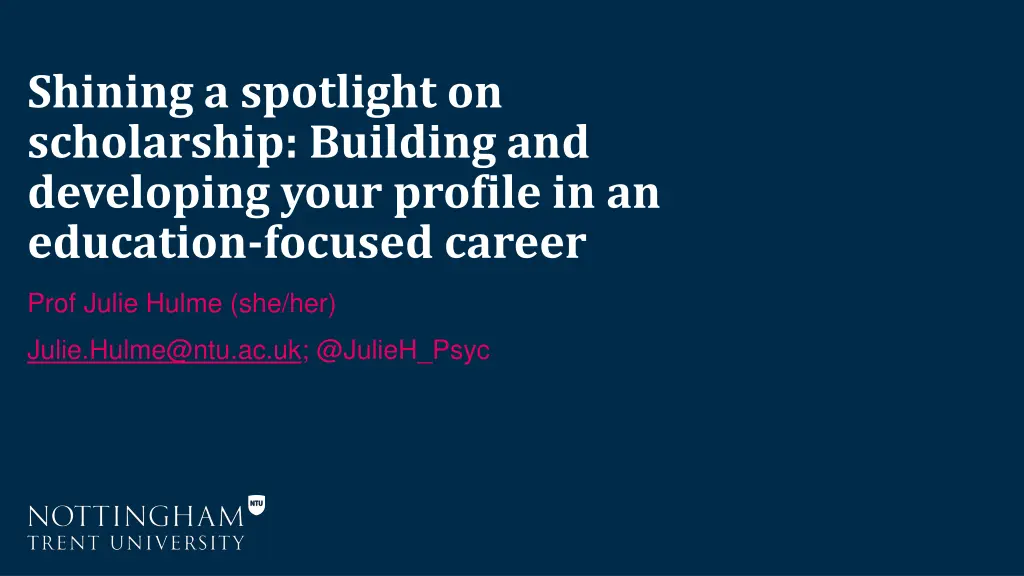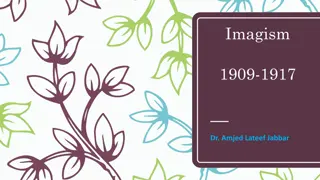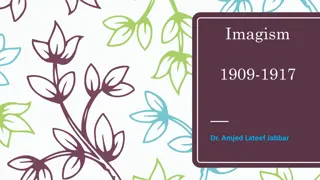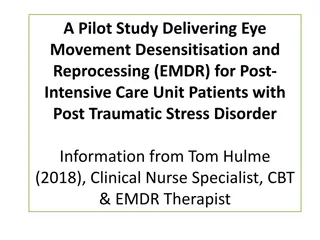
Building Your Profile in an Education-Focused Career: Insights from Prof. Julie Hulme
Explore strategies for developing your profile in education-focused academia with insights from Prof. Julie Hulme. Learn about finding expertise, building reputation, and navigating the academic landscape to enhance your impact and recognition.
Download Presentation

Please find below an Image/Link to download the presentation.
The content on the website is provided AS IS for your information and personal use only. It may not be sold, licensed, or shared on other websites without obtaining consent from the author. If you encounter any issues during the download, it is possible that the publisher has removed the file from their server.
You are allowed to download the files provided on this website for personal or commercial use, subject to the condition that they are used lawfully. All files are the property of their respective owners.
The content on the website is provided AS IS for your information and personal use only. It may not be sold, licensed, or shared on other websites without obtaining consent from the author.
E N D
Presentation Transcript
Shining a spotlight on scholarship: Building and developing your profile in an education-focused career Prof Julie Hulme (she/her) Julie.Hulme@ntu.ac.uk; @JulieH_Psyc
Outline Education-focused academics Finding your own expertise Going meta Building a reputation and developing your impact and profile Reward and recognition Collective action how can we help each other? Nottingham Trent University | Scholarship spotlight 2
Academic staff in UK universities (HESA) WonkHE: https://wonkhe.com/ wonk-corner/hesa- spring-2024-staff-in- outline/ Teaching only 34.65 30.57 32.45 32.50 35.61
Teaching only? How many people do you know who only teach? E.g. NTU Teaching and practice/Teaching and scholarship Keele Education and scholarship Lincoln Teaching, scholarship & professional practice Manchester Teaching and scholarship Beds - Teaching and Student Academic Experience There s nearly always an and even if it isn t written in a contract
Example Teaching Fellow / Senior Teaching Fellow roles My two teaching only experiences TF: 2002-2004 Teaching and Psychology-specific student support provision STF: 2015-2016 Teaching and transform all of our learning and teaching provision to improve the student experience and be Director of Education and please develop staff and take on some uni- level roles? What is your and ?
Scholarship expertise Trigwell (2013) scholarship and SoTL have many (contested) definitions and many purposes. Generally: Improving and enhancing teaching, learning, assessment, and more, in higher education Evaluating and determining quality Evidence-based and systematic Nottingham Trent University | Scholarship spotlight 6
Practitioner (pracademic) expertise Practitioner-academics and academic identities A revolving door between practice and academia? with tensions around shifting identities and transitions (Dickinson et al., 2020 fragile academic selves ). Imposter syndrome not a real academic ? in a higher education sector where research is often prized (e.g. Hulme, 2022). BUT support students to be knowledge-able rather than knowledgeable; networks and employer engagement that contribute to curricula; industry-university partnerships (Dickinson et al., 2020). Need to maintain currency in practice area while also developing in academic role.
Leading effective educational change requires educational expertise (e.g. Nelson and Campbell, 2017; Fung, 2017; Gorard, 2020), and educational expertise is more likely to be located in those who choose to study it than it is in traditional discipline-specific researchers. Thus education-focused academics are frequently positive disruptors (Akerman, 2020). Hulme (2022)
The BOGOF model of scholarship what are you already doing that can gain more benefits? Scholarship the evidence that underpins the decisions you make (that achieves the T success) Scholarship the products/resources you produce that deliver the T Scholarship the evaluation of the design, the development, the delivery, the products, the T, the outcomes Where s your BOGOF opportunity?
Thinking about BOGOF scholarship Finding your own expertise or turning your teaching into outputs What are the big questions for you at the moment? What are the problems? (or what can improve?) How do you find or develop solutions? How do you know if your solution works?
More BOGOF thinking Hamilton, P., Hulme, J.A. & Harrison, E.D. (2023 online 2021). Experiences of higher education students with chronic illnesses. Disability and Society. DOI: 10.1080/09687599.2021.1907549 Hulme, J.A., Hamilton, P., Lyons, S., Crabb, E., Cascone, C., Davis, S., Fahey, C., Holland, B., Hussain, M., & Knight, E. (2023). Students as researchers: Amplifying disabled student voices. In: Disability Evidence Review with TASO. https://taso.org.uk/wp-content/uploads/Uni-Lincoln-Disability-Evidence- Review-with-TASO.pdf Hulme, J.A. (2022). Amplifying disabled students voices. ANTF blog, 25/03/2022. https://ntf- association.com/amplifying-disabled-student-voices/ Hulme, J.A. (September, 2021). Social identity and disability in the classroom. Changing States of Mind podcast. https://changingstatesofmind.libsyn.com/social-identity-and-disability-in-the- classroom-with-dr-julie-hulme. Lyons, S.M. & Hulme, J.A. (June, 2021). Why are so many students locked out of their education? WonkHE (18/06/2021). https://wonkhe.com/blogs/why-are-so-many-students-locked-out-of-their- education/ Hulme, J.A., McDermott, H. & Kent, A. (2022). Truly inclusive education: Teaching qualitative methods in psychology to enhance inclusion in the higher education psychology curriculum. QMiP Bulletin, 34, 22-29.
IMPACT Going meta! Shulman (1999): An act of intelligence or artistic creation becomes scholarship when it possesses at least three attributes: it becomes public, it becomes an object of critical review and evaluation by members of one s community, and members of one s community begin to use, build upon, and develop those acts of mind and creation Hutchings and Shulman (1999): A scholarship of teaching is not synonymous with excellent teaching. It requires a kind of going meta , in which faculty frame and systematically investigate questions related to student learning the conditions under which it occurs, what it looks like, how to deepen it, and so forth and do so with an eye not only to improving their own classroom but to advancing practice beyond it. Nottingham Trent University | Scholarship spotlight 13
Going meta! Who can see your work? How do they find it? Who are your stakeholders? Who cares? Who is using your work? What is the reach, impact, and value? What is the potential for reach, impact, value? Nottingham Trent University | 14
Where are you? Kern et al (2015) Dimensions of activity relating to teaching (DART)
My scholarship journey Scholarship of scholarship! Disabled students as researchers Journal articles Profs in Prep network and more Assessment and feedback research Psychological literacy Blog Advance HE resources Scholarly teaching Open educational resources
Purposeful planning for impact How do you find the BOGOF deal? Topical issue - who shares the problem? Resources funding? time? students as researchers? collaborative networks? Stakeholders internal and external Plan collaboration and evaluation from the start who has the skills? Disseminate how? where? How do you get the BOGOF outputs? How to assess reach, impact, value?
Reward and recognition Promotion? AFHEA/FHEA/SFHEA/PFHEA? National Teaching Fellowship, CATE award? Fellowship of or awards from your professional body? What s appropriate in your world? Need for a clear narrative; evidence of reach, impact, value. A claim of expertise. Who are you? What are you known for? What do you want to achieve? Nottingham Trent University | Scholarship spotlight 18
Building (Y)OUR scholarship profile and making impact visible Nottingham Trent University | Scholarship spotlight 19
There are relatively few teaching-focussed staff in more senior positions who can review, mentor and support teaching staff; act as role models for junior staff who are seeking to develop a teaching/education career (Fung and Gordon, 2016); help individuals to collate a mix of quantitative and qualitative evidence that provides a clear sense of their teaching achievements (McHanwell & Robson, 2018) Networking and peer support finding your tribe
Networks and resources Profs in Prep email me on Julie.Hulme@ntu.ac.uk UK Teaching-Focused Higher Education Network sign up to our JISCmail list, HETEACHINGNETWORK@JISCMAIL.AC.UK, via https://jiscmail.ac.uk National Teaching Repository Scholarship spotlight under construction! Start your own? Networks enable you to disseminate your work (reach), to see it being implemented and evaluated (impact), open up new opportunities, raise your profile, provide a pool of peer reviewers, referees and assessors. And COLLABORATORS!!
Reflections and discussion Where is your and ? what is your expertise? How can you make your scholarship more visible? What is your impact where do you make a difference? What can we do collectively? What next?
Thank you! ntu.ac.uk



